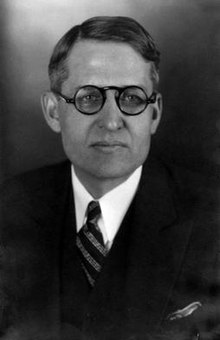Harvey Fletcher
| Harvey Fletcher | |
|---|---|
 |
|
| Born |
September 11, 1884 Provo, Utah, USA |
| Died | July 23, 1981 (aged 96) Provo, Utah, USA |
| Nationality | United States |
| Fields | Physics |
| Institutions |
Western Electric Bell Laboratories Columbia University |
| Alma mater |
Brigham Young University University of Chicago |
| Doctoral advisor | Robert A. Millikan |
| Known for | Invention of the hearing aid The father of stereophonic sound |
| Notable awards |
Presidential Citation ASA Gold Medal (1957) Louis E. Levy Medal IEEE Founders Medal (1967) Grammy Award (2016) |
Harvey Fletcher (September 11, 1884 – July 23, 1981) was an American physicist. Known as the "father of stereophonic sound", he is credited with the invention of the 2-A audiometer and an early electronic hearing aid. He was an investigator into the nature of speech and hearing, and made contributions in acoustics, electrical engineering, speech, medicine, music, atomic physics, sound pictures, and education.
Fletcher was born in Provo, Utah. He graduated from Brigham Young High School in 1904. He enrolled at Brigham Young University (BYU), graduating in 1907 with a bachelor's degree. He married Lorena Chipman. They were the parents of seven children. Harvey Fletcher was the father of James C. Fletcher, former president of the University of Utah and NASA Administrator and of Harvey J. Fletcher, a Brigham Young University math professor.
In 1911 Fletcher was the first student ever to earn a Ph.D. summa cum laude from the University of Chicago. His dissertation research was on methods to determine the charge of an electron. This included the oil drop experiment commonly attributed to his advisor and collaborator, Robert Andrews Millikan. Millikan took sole credit, in return for Fletcher claiming full authorship on a related result for his dissertation. Fletcher's contributions were detail-oriented but still contributed to the successful experiment, in which he incorporated, among other things, experience with projection lanterns. Millikan went on to win the 1923 Nobel Prize for Physics, in part for this work, and Fletcher kept the agreement a secret until his death.
After completing his doctorate, he returned to Brigham Young University, where he became the head of the physics department. He served in this capacity from 1911 until 1916. Fletcher left BYU to work at Western Electric, establishing himself as a researcher. He joined the Bell Telephone Laboratories' Engineering Staff Research Department where he found great interest in the physics of sound (acoustical science). He worked there from 1933-1949, when he became a professor of electrical engineering at Columbia University from 1949 to 1952. He returned to Brigham Young University in 1952 to be the Director of Research. He served in that role as well as being the first dean of the new College Physics and Engineering Sciences until 1958.
...
Wikipedia
